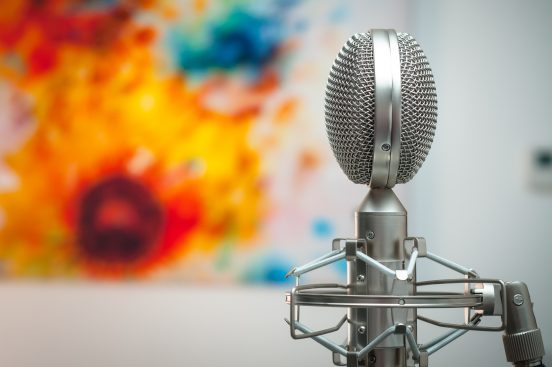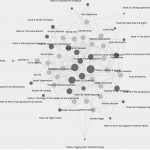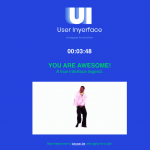Recorded using Voice-to-Text in Microsoft Word
“So I was thinking about public speaking and I guess this is the story that I will tell that had to do with my first experiences with public speaking so I went to a French immersion elementary school program which means that starting in kindergarten all day education was in French with only a couple of hours a week in English starting and I think grade 3 so from kindergarten to grade 7 all day long French all the time which was great for me because that’s my first language and when I came to Canada I did not in fact speak English Anne so I didn’t struggle to pick up the new language but surprisingly neither did any of my classmates and by the time we were in grade three while maybe they didn’t have the accent that I had everybody was pretty good at conversational and school related French and so every year as a way to keep the oral education going BC wide there is a contest that gets school age children to write a quick story about absolutely anything can be fictional or nonfiction it can be funny or sad and then present it and so it was a mandatory activity that I think all the way back to the grade one we did every year but in grade one year only really required to see I don’t know right about 10 seconds that then you present in front of everybody but by the time we were in grade five it was a big deal it’s called the cone cool daawa and we hear choose a topic and spent about a month during our sort of French time in class like language arts moments in class writing researching rewriting and then in the end memorizing what had to be between three and five minute long speech and so I can remember saying my speech aloud what must have been 1000 times trying to memorize each and every word and we were allowed to have cue cards I think for a couple of years and then it was like no more cue cards so I can really distinctly remember one year I wrote a story about how a sock gets lost in the laundry and what happens to the sock and it was like an imaginary story about where the sock you always lose in the dryer ends up and I think it became a sock puppet and had a great life and then another year I wrote about what happens to a balloon when a little boy or girl lets a balloon go and it floats up into the atmosphere and I think it was sort of more scientific or at least I tried to make it that way when I was quite young and then another year I wrote a comedic one about the kinds of people you meet on an airplane which sounds like a standup gig but it was pretty good I can really just think they remember my favorite one that one of my classmates road was about nothing his topic was a yeah or nothing and he spent the whole 3 1/2 minutes just sort of talking in circles about the concept of nothingness and it was very powerful anyways if you did well at the school level and if you wanted to you could go to the district level so like all the schools in my city and then if you did well that there was always a BC competition and I think when my brother was in grade eight he made it to the BC competition and he placed second in BC I don’t remember ever choosing to go or maybe I wasn’t chosen to go but it always really I think it impacted me and it was a kind of activity that we knew was going to happen every year and although it was challenging having spent all that time memorizing something then you have to go and stand in front of someone at least you’re very very prepared and I think it teaches the art of speaking in public which I think is a really important skill that sometimes students are missing I find especially as a teacher of young students that when I ask them to present in front of the class that some kids will come to me on their own and say they just can’t do it and I understand nervousness but I think that it’s something that we can we can learn and we can grow and we can become better at and so having that sort of forced competition every year is a really good thing we don’t do it at the school later currently teach at I don’t teach language arts so it wouldn’t be in my class anyways but the language arts teachers haven’t chosen to do it but I think that it’s it’s really missing teaching students to or just eventual adults even to stand in front of a group of people and just be willing to work really hard to memorize something to then deliver a coherent speech engaging the audience and really delivering something that’s that’s interesting and captivating.”
- How does the text deviate from conventions of written English?
The most striking difference is the lack of punctuation. This is a five minute story that spans over 800 words and there is not a single comma or period. There are no divisions between thoughts and no paragraphs to separate topics. When you speak there are pauses and changes in tone that indicate the end of a thought. These pauses are not recognized by the program and so don’t show up in the written form. It makes the story quite hard to read in a traditional sense. I found when re-reading the text that I struggled to read it quickly. Usually in written English it is easy to skip to the next thought because there is a demarkation.
- What is “wrong” in the text? What is “right”?
For the most part the text to speech application that I used was quite accurate. I happen to be telling a story about French Immersion and I used some French words in my story that were completely butchered. I wanted to say “Concour d’art oratoire” and it was recorded as “cone cool daawa”. At another point in the story I wanted to say the French work “rien” and it was recored as “a yeah”. Understandably the program was set to understand English and not any other language.
I recently updated my version of Microsoft powerpoint and now each time that I start a presentation (which is pretty much daily in class) it starts to record my voice and tried to create subtitles. I usually catch it right away and turn the function off but sometimes I forget to. The problem is that the program is set to English and I only speak French in class. This results in some really funny translations that my Grade 8 students seem to really enjoy. The words that pop up on the screen below the presentation are a jumble of random nous usually, from Marshmallow to Jogger and all sorts of other nonsense phrases. I think the technology is a great idea, to promote more accessibility in the classroom but I will have to see if I can trust the French version of this application before I use it actively in class. For now the text to speech function is a distraction.
In reading through the The First IT Revolution (Gnanadesikan, 2011) I found myself wondering about the coding that goes into creating speech to text programs that work in multiple languages. Do the programs use the IPA (International Phonetic Alphabet) in order to translate the sounds into meanings that can then transformed into the English alphabet. I consider that the program must also reference the OED or some other bank of words as well as some grammar rules. The amount of coding necessary to create this kind of accuracy is astounding.
My story was accurately recorded and turned into text but my major qualm is that the results is far from an ideal format for pleasurable reading. The story was recorded verbatim and the accuracy is quite amazing. This technology has certainly come a long way in the last couple of years and other than the trouble with punctuation it is a compelling way to create written text.
- What are the most common “mistakes” in the text and why do you consider them “mistakes”?
There are several times where I said “than” but it was written down as “then”. The mistake is not huge and in context the meaning is clear. However it appears that I do not know the difference between the two meanings of the word. Verb tenses are also sometimes mixed up, in the first line I meant “has” but the program heard “had”, again in context it is not difficult to understand what was meant but it is not the word I meant to have recorded. I consider these “mistakes” because I had not intended to have those words recorded. It might be that my oral English went against the programs conventions of grammar, however I would still consider them mistakes because it wasn’t what I actually said. I think any deviation from the intended meaning can be considered a mistake.
- What if you had “scripted” the story? What difference might that have made?
I think if I had scripted and read the story I would not have used words like “so” quite so frequently. I used it as a way of getting on to the next point, in the same way that a period or a paragraph marker would do in a written story. I also, probably, would not have repeated myself so often, I found that in re-reading the story afterwards I had actually repeated some of my ideas more than once. I also thought I had been much more descriptive in the story but upon reflection I actually did not use many descriptive words. When I tell a story I use my hands a lot and I found myself doing this, which was obviously not recorded. Had I taken the time to write out the story and then record it I would have made edits to the flow of the story. The main difficulty with the speech to text program would not have changed however, the difficulty reading the story really comes from the lack of punctuation.
- In what ways does oral storytelling differ from written storytelling?
Good oral story telling can use emphasis in the form of pitch and volume as well as tone. Pauses create anticipation, divide ideas and indicate change or a break. Oral story telling also traditionally would include body language, hand movements, emotions conveyed by facial expressions. Even the movement of the person in space can help to convey a story. There may be room in oral storytelling for the use of different accents or ‘voices’ if a person is particularly gifted at acting. There is also more of an interactive nature to oral story telling, I imagine that the person who is telling the story takes cues from the audience and plays off of their emotions and reactions during the story telling. If you’ve ever tried listening to a stand up comedy show that had no live audience you can immediately see how differently the comedian acts when there is no reaction to his jokes. Even TV shows that are not live but use a laugh track seem strange and flat when the laugh track is removed. An important part of the oral story telling medium is the audience.
References:
Gnanadesikan, A. E. (2011).“The First IT Revolution.” In The writing revolution: Cuneiform to the internet (Vol. 25). John Wiley & Sons (pp. 1-10).







Anne
February 10, 2021 — 11:19
I like your observation that you found yourself repeating ideas during oral storytelling. I also do that a lot when I’m speaking! Interestingly, people generally don’t seem annoyed by an oral storyteller repeating ideas but if that were to happen in a written story, we as readers would get very frustrated. For some reason, circling back around to ideas in speech seems more acceptable (and maybe even helpful) in ways that it just isn’t in written text.